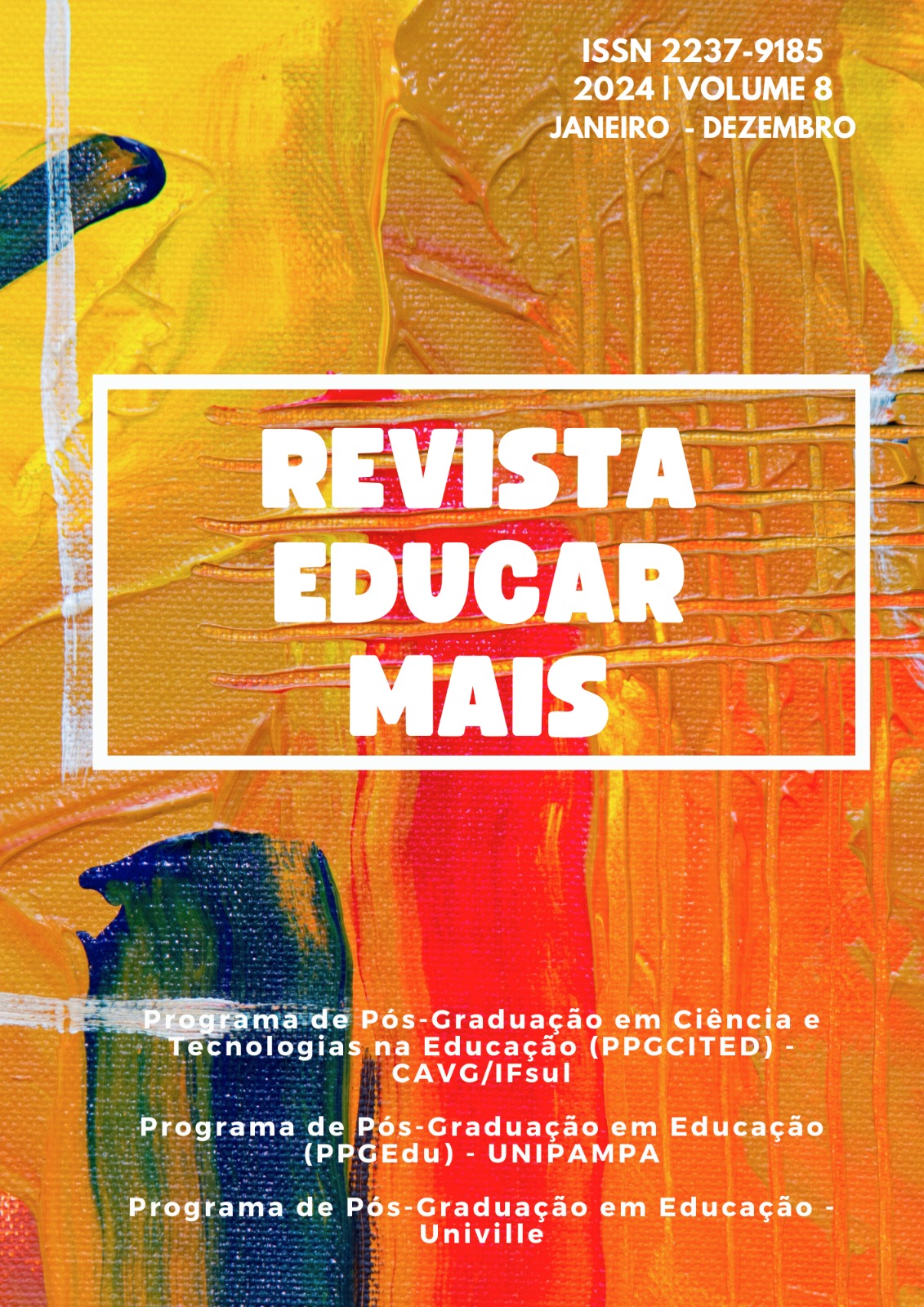Corporate education: the importance of correlating theory and practice within a new service model
DOI:
https://doi.org/10.15536/reducarmais.8.2024.3670Keywords:
Corporate education, Beauty company, Stores, Consumers, Service modelAbstract
Analysis of the training of the new service model adopted by a company in the beauty sector in terms of the relationship between theory and practice for employees in the stores. A critical case study, with documentary analysis and field observations. The framework dealt with consumer behavioral changes that have influenced the global business scenario. Before the decision to buy is made, these consumers reflect on the loyalty of the brand-consumer relationship. Requiring consistent, personalized training strategies that are centered on the needs of employees, reflecting theory and practice within a service model. The results show the relevance of the content taught during the training, which is important for the performance of store employees. However, this study identified that there are still few studies in the area, as it is a pilot project.
Downloads
References
ALIZADEH H.; NAZARPOUR K, H. O efeito das relações marca-consumidor na fidelidade à marca mediada pela criação de valor da marca e moderada pelas características da comunidade de marca no setor de hospitalidade. Revista Brasileira de Gestão de Negócios, 24(4), p.594-616. https://doi.org/10.7819/rbgn.v24i4.4200. 2022.
ASSUNÇÃO, A. Á.. Metodologias ativas de aprendizagem: práticas no ensino da Saúde Coletiva para alunos de Medicina. Revista Brasileira de Educação Médica, v. 45, n. 3, p. e145, 2021.
BECKER, J. Mobile learning como suporte de uma modalidade híbrida na educação corporativa. Curitiba/PR. Centro Universitário Internacional Uninter. Dissertação de Mestrado. Disponível em https://repositorio.uninter.com/handle/1/449. 2019.
BRITO, J.M.S; SARAIVA, P. M. Storytelling: uma análise de aplicabilidade no planejamento estratégico de marketing. Id On Line: Revista de Psicologia, Cariri, 59(16), 234-249. https://doi.org/10.14295/ideonline.v16i59.3387. 2022.
CHINOMONA, R. Brand communication, brand image and brand trust as antecedents of brand loyalty in Gauteng Province of South Africa. African Journal of Economic and Management Studies, 7(1), 124-139. 2016.
EBOLI, Marisa. Educação corporativa no Brasil. Mitos e verdades. São Paulo: Gente, 2004.
FILATRO, A., Cavalcanti, C.C. et al. DI 4.0: inovação em educação corporativa - São Paulo: Saraiva Educação, 2019.
FLEURY, M. T. L. Gerenciando a diversidade cultural: Experiências de empresas brasileiras. RAE-Revista de Administração de Empresas, 40(3), 18-25. 2000.
GOMES, V. H. S. et al. Educação Corporativa a Distância: uma Revisão Integrativa. EaD em Foco, v. 10, n. 2, e1034. DOI: https://doi.org/10.18264/eadf.v10i2.1034. 2020.
JOHNNY. Estudo aponta novos perfis de consumidor de cosméticos para 2023. Cosmetic Innovation. Disponível em:https://cosmeticinnovation.com.br/estudo-aponta-novos-perfis-de-consumidor-de-cosmeticos-para-2023/ Acesso em 03 de novembro de 2023. 2023.
LANGHI, C.; CORDEIRO, D. de S. .; SIMÕES, M. de L. .; STETTINER, C. F. . Educação corporativa: aprendizagem significativa no âmbito das empresas. Revista Educar Mais, [S. l.], v. 5, n. 5, p. 1003–1017, 2021. DOI: 10.15536/reducarmais.5.2021.2584.
MEISTER, J. C. Educação Corporativa: a gestão do capital intelectual através das universidades corporativas. São Paulo: Makron Books. 1999.
MINISTÉRIO DO TRABALHO - Classificação Brasileira de Ocupações. Disponível em https://www.ocupacoes.com.br/cbo-mte/233225-professor-instrutor-de-ensino-e-aprendizagem-em-servicos. Acesso em 20 de outubro de 2023.
MOURÃO, L., ABBAD, G. S. Avaliação de necessidades de TD&E: proposição de um novo modelo. RAM, Revista Administração Mackenzie. 2012.
MUYLAERT, P. R.; VILLARDI, B. Q. Plano de desenvolvimento de competências profissionais: integrando gestão de desempenho e educação corporativa. Revista Gestão e Planejamento, Salvador, v. 22, p. 209-225, jan./dez. 2021.
REINERT, K. C. J.; MINUZI, N. A. Estratégias para a utilização de recursos tecnológicos na educação corporativa. Cenas Educacionais, [S. l.], v. 4, p. e10736, 2021.
RODRIGUES, J.O. O impacto da gamificação na educação corporativa em empresas brasileiras. Lisboa: ISCTE-IUL. Dissertação de mestrado. 2019.
SCHNEIDER, Suhr IRF, Rolon VEK, Almeida CM. Sala de aula invertida em EAD: uma proposta de Blended Learning. Rev Intersaberes; 8(16):68-81. 2013.
SITE APPSORTEOS. Roleta Aleatória. Acesso em 1 de out. 2023. Disponível em https://app-sorteos.com/pt/apps/girar-roleta-aleatoria.
SOUSA, J. R. de; SANTOS, S. C. M.. Análise de conteúdo em pesquisa qualitativa: modo de pensar e de fazer. Pesquisa e Debate em Educação, Juiz de Fora: UFJF, v. 10, n. 2, p. 1396-1416, ISSN 2237-9444. DOI: https://doi.org/10.34019/2237-9444.2020.v10.31559. 2020.
Downloads
Published
How to Cite
Issue
Section
License
Copyright (c) 2024 Andreza Conceição da Silva Magalhães, Hugo Cesar Bellas

This work is licensed under a Creative Commons Attribution-NonCommercial 4.0 International License.
DECLARATION OF RESPONSIBILITY: I hereby certify that I partially or fully participated in the conception of the work, that I did not hide any links or financial agreements between the authors and companies that may be interested in this article publication. I certify that the text is original and that the work, partially or fully, or any other work with a substantially similar content written by me, was not sent to any other journal and it will not be send while my submission is being considered by Revista Educar Mais, whether in printed or electronic format.
The author responsible for the submission represents all the authors of the manuscript and, when sending the article to the journal, guarantees s/he has obtained the permission to do so, as well as s/he guarantees the article does not infringe upon anyone’s copyright nor violate any proprietary rights. The journal is not responsible for the opinions expressed.
Revista Educar Mais is Open Access, does not charge any fees, whether for submission or article processing. The journal adopts Budapest Open Access Initiative (BOAI)’s definition, i.e., any users are permitted to read, download, copy, distribute, print, search and link to the full texts of these articles.
All the articles are published under the Creative Commons Atribuição-NãoComercial 4.0 Internacional license. The authors keep the copyright of their production. That way, they must be contacted directly if there is any interest in commercial use of their work.
















